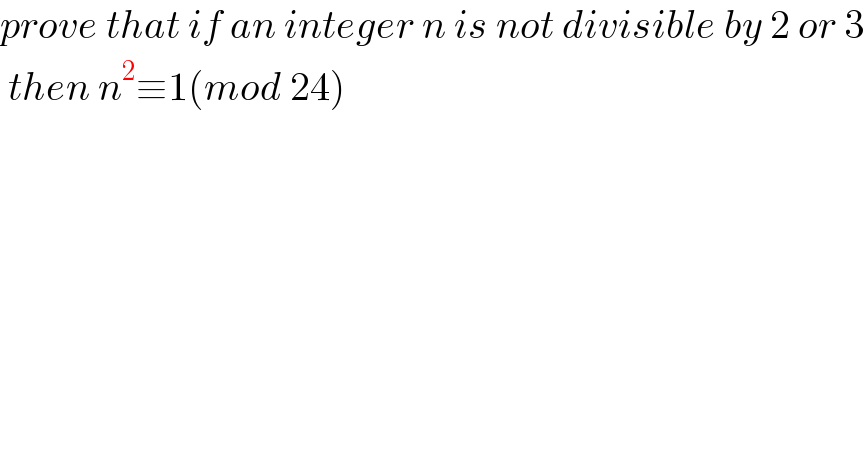
Question Number 217129 by ArshadS last updated on 02/Mar/25

$${prove}\:{that}\:{if}\:{an}\:{integer}\:{n}\:{is}\:{not}\:{divisible}\:{by}\:\mathrm{2}\:{or}\:\mathrm{3} \\ $$$$\:{then}\:{n}^{\mathrm{2}} \equiv\mathrm{1}\left({mod}\:\mathrm{24}\right) \\ $$
Commented by A5T last updated on 02/Mar/25

$$\mathrm{This}\:\mathrm{is}\:\mathrm{not}\:\mathrm{necessarily}\:\mathrm{true}.\: \\ $$$$\mathrm{n}\:\mathrm{could}\:\mathrm{also}\:\mathrm{be}\:\equiv\:\mathrm{5},\mathrm{7},\mathrm{11},\mathrm{13},\mathrm{17},\mathrm{19},\mathrm{23}\:\left(\mathrm{mod}\:\mathrm{24}\right) \\ $$
Commented by ArshadS last updated on 02/Mar/25

$${sir}\:{question}\:{has}\:{been}\:{corrected}. \\ $$
Answered by A5T last updated on 02/Mar/25

$$\mathrm{2}\nmid\mathrm{n}\:\mathrm{and}\:\mathrm{3}\nmid\mathrm{n}\Rightarrow\mathrm{n}\equiv\mathrm{1},\mathrm{5},\mathrm{7},\mathrm{11},\mathrm{13},\mathrm{17},\mathrm{19}\:\mathrm{or}\:\mathrm{23}\:\left(\mathrm{mod}\:\mathrm{24}\right) \\ $$$$\Rightarrow\mathrm{n}^{\mathrm{2}} \equiv\:\mathrm{1},\mathrm{25},\:\mathrm{49},\mathrm{121},\mathrm{169},\mathrm{289},\mathrm{361}\:\mathrm{or}\:\mathrm{529}\left(\mathrm{mod}\:\mathrm{24}\right) \\ $$$$\mathrm{which}\:\mathrm{are}\:\mathrm{all}\:\mathrm{equivalent}\:\mathrm{to}\:\mathrm{1}\:\left(\mathrm{mod}\:\mathrm{24}\right)\: \\ $$
Commented by ArshadS last updated on 03/Mar/25

$$\mathcal{N}{ice}\:{approach}! \\ $$
